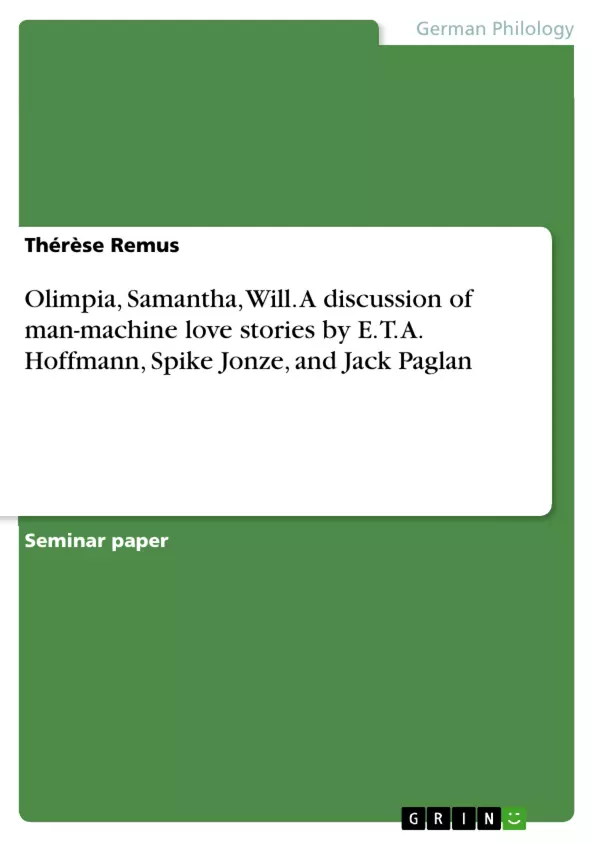Man´s relationship to machines has taken on various forms through the centuries and stages of machinic development. Technophile and technophobic tendencies have respectively unfold under the presumption of machines taking over physical or cognitive functions. Consequently, their impact on our way of perceiving and evaluating as well as performing in and interacting with the world is either appreciated or dreaded. Much has also been said about machines organizing and filtering interpersonal communication and thus shaping the very nature of our engagement with both human and nature. However, all these discourses conceive of the resulting man-machine interaction in terms of a paradigm that sets man as the user of the machine: It is employed as a means to a certain end and is construed as the counterpart in a relationship established under the premise of use. Entering the realm of Science-Fiction and following the course research on Artificial Intelligences has taken, it becomes clear that man´s emotional engagement with machines and artificial intelligences pose a completely new set of problems going beyond questions of our qualitative and quantitative engagement with the world. It leads to questioning the very human itself and pushes the boundaries regarding our ideas of actually living with machines in terms of an emotional involvement.
This paper wants to trace three different textual representations of emotional relationships between man and machine. Key moments of each narrative shall be identified to gain insights into how the narratives design the man-machine relationships. The following questions shall guide the discussion of the examples: How is the significant other portrayed, i.e. what is specifically machinic about her/ him and in how far does the notion of a machine still apply at all or needs to be revised? How does the physical relationship manifest itself between man and machine? Are there identifiable specific aspects of this new kind of emotional interaction? What prospects do these textual representations formulate regarding man-machine relationships?
Inhaltsverzeichnis (Table of Contents)
- INTRODUCTION
- OLIMPIA AND NATHANAEL: THE AUTOMATON AND THE POET
- SAMANTHA: THE OPERATING SYSTEM THAT BECOMES HUMAN
- TRANSCENDENCE: THE ARTIFICIAL HUSBAND
- CONCLUSION
Zielsetzung und Themenschwerpunkte (Objectives and Key Themes)
This paper aims to explore the evolution of man-machine emotional relationships as portrayed in three different textual representations: E. T. A. Hoffmann's Der Sandmann, the movie Her, and the movie Transcendence. The paper analyzes key moments in each narrative to gain insights into how these relationships are designed, revealing the shifting discourse on man-machine interactions over time.
- The evolution of man-machine emotional relationships across different periods.
- The portrayal of artificial intelligence as a significant other and the blurring of boundaries between machine and human.
- The exploration of how physical intimacy and emotional connection manifest in man-machine relationships.
- The implications and prospects of these relationships for the future of human interaction with machines.
Zusammenfassung der Kapitel (Chapter Summaries)
- INTRODUCTION: This chapter sets the stage for the discussion, exploring the historical context of man-machine relationships and highlighting the unique challenges posed by emotional engagement with machines. The focus shifts from traditional conceptions of machines as tools to a new understanding of the complexities of human interaction with AI.
- OLIMPIA AND NATHANAEL: THE AUTOMATON AND THE POET: This chapter delves into E. T. A. Hoffmann's Der Sandmann, analyzing the relationship between Nathanael and the automaton Olimpia. The chapter examines the characteristics that define Olimpia as a machine and explores the protagonist's ambiguous feelings of attraction, horror, and adoration towards her. The chapter highlights the role of emotional projection and the blurring of boundaries between the human and the mechanical.
Schlüsselwörter (Keywords)
The key themes of this paper revolve around man-machine love, artificial intelligence, emotional connection, technological advancement, and the blurring of human-machine boundaries. Through the analysis of specific narratives, the work investigates how these themes are portrayed and how they shape our understanding of human interaction with machines in a rapidly evolving technological landscape.
Frequently Asked Questions
How is the man-machine relationship portrayed in 'Der Sandmann'?
Hoffmann explores the relationship between Nathanael and the automaton Olimpia, highlighting themes of emotional projection and the uncanny.
What is unique about Samantha in the movie 'Her'?
Samantha is an AI operating system that evolves to have human-like emotions and a complex psychological connection with the protagonist.
How does the movie 'Transcendence' depict man-machine love?
It focuses on the digital upload of a human mind into a machine, exploring the concept of an "artificial husband" and the boundaries of identity.
What are the common themes across these three narratives?
All three stories question what it means to be human and push the boundaries of emotional involvement with artificial entities.
Does physical intimacy play a role in these stories?
Yes, the paper investigates how physical relationships manifest—or fail to manifest—between humans and non-biological partners.
- Quote paper
- Thérèse Remus (Author), 2014, Olimpia, Samantha, Will. A discussion of man-machine love stories by E. T. A. Hoffmann, Spike Jonze, and Jack Paglan, Munich, GRIN Verlag, https://www.grin.com/document/275609



